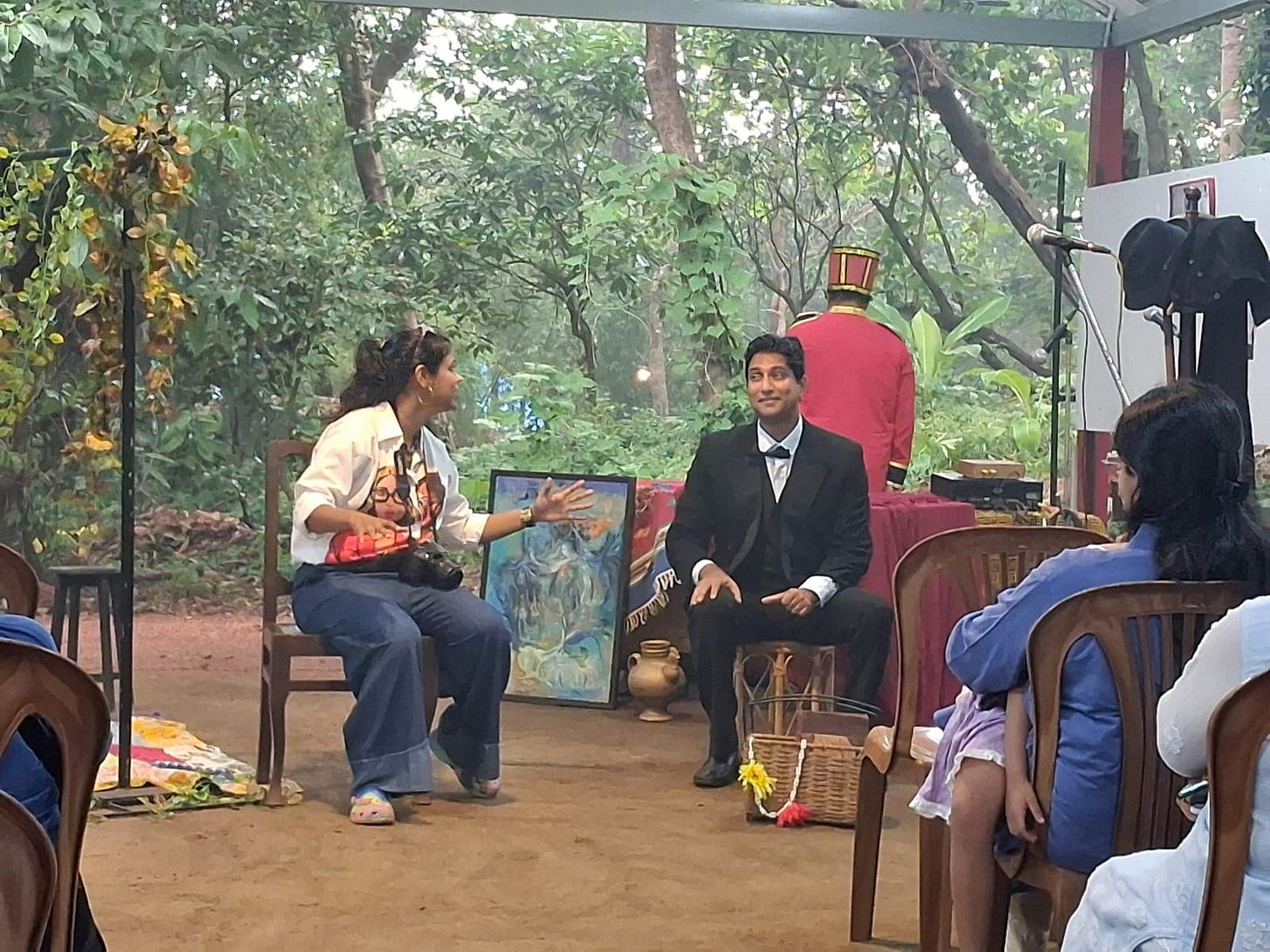
One of the advantages of shifting back to Goa in 2021, is that I get to know more about my beloved homeland. Not through the popular tourist lens. But in the creative expression of the performance arts.
Last week, I attended “Anybody Home?”, yet another thought-provoking play by The Mustard Seed Art Company (TMSAC), a homegrown theatre platform that has engaged Goa’s amateur theatre artists and creators for decades.
The setting was the stunning Big Foot - Ancestral Goa, a museum space in Loutolim, a village that’s home to artists like Mario Miranda, and several musical artists of yore. The trudge up the hill was a little daunting.
But the space is simply breathtaking. The open-air venue houses around 50 seats in a tiny enclosure enveloped by forests and the chirping of the birds.
I went along with family and friends, and was curious to unpack the latest production, based on the life and times of Goan stalwart Francisco Luís Gomes. Truth be told, I had never heard of this gentleman before TMSAC began promoting the play. A bit of googling revealed that he was a physician-surgeon, economist, author and parliamentarian born in Portuguese Goa in 1829. He’s also described as a linguist, polyglot and polymath.
The play, itself, unravels in a non-linear, abstract format. Salvita, a young woman and descendant of Gomes, travels from Mexico to his ancestral home in Navelim, in the hopes of unpacking a slice of her family’s history.
Having celebrated many a “Día de los Muerto” (Day of the Dead), she is very comfortable with the idea of conversing with ghosts. To her excitement, she meets her long dead Primo Francisco, and proceeds to have some deep conversations with him. A cranky, bossy neighbour also becomes a part of the narrative and adds comic relief, as does Magnod the sepoy, a spirited character from Gomes’ novel “Os Bramhanes”.

Post the play, I googled Gomes in great detail. The Internet is sparsely populated with information on him. But here are some key facts.
Gomes stood for elections in Margao as part of Partido Regenador (Regenerator Party). He was elected to Cortes Gerais (Portuguese parliament) in 1860.
His first speech in parliament drew attention to his excellent oratory skills. He identified with being from India - the land where chess was invented and the home of the Mahabharata.
He was invited to join the Portuguese cabinet three times but declined due to lack of alignment with the Government’s agenda.
In his role as a parliamentarian, he reviewed the Goan budget and flagged wasteful expenditures (something our current Goa govt can learn from).
Among his political positions - he opposed slavery, and campaigned against the colonial injustices across the Portuguese empire.
He remained a member of parliament until his death in 1869 at age 40, on a voyage to Goa to attend his cousin’s wedding (I find this heartbreaking - a premature end to a man of great integrity. It occurred on the 30th of September, a day before this piece was published, 155 years later).
Gomes earned the epithet “prince among intellectuals” for seeding a kind of anti-colonial political consciousness in Goans, a century before Goa’s liberation.

Today, our little state is a hotbed of activism in protest of our government’s mercenary actions, the impact of which will be irreversible. Their values are, obviously, diagrammatically opposite to those of Gomes, a politico who lived by a certain moral code.
He was a man who thought critically, and in many ways, was ahead of his times. In his book, for instance, he explored the harsh impact of the caste system and untouchability, and weaved an inter-caste, inter-racial marriage.
As Goans we stand at a kind of precipice. Beyond it, we invite ecological disaster and a loss of identity. But plays like these remind us of what’s important - that there’s still hope to protect the beauty, harmony, and culture of Goa by speaking truth to power.
At the end of the one-hour production, my friend’s nine-year old Tara proclaimed: “I am so disappointed that it is over. Though I did not understand everything, I REALLY LOVED IT.” Then she proceeded to ask MANY questions, and wanted to read his book. As do I.





Sounds like a wonderful performance in an amazing space. I wish more people could watch it! We had visited Ancestral Goa many years ago, and I remember the big foot etched into a rock. How wonderful to know that it has grown organically and developed over the years, without losing its charm.